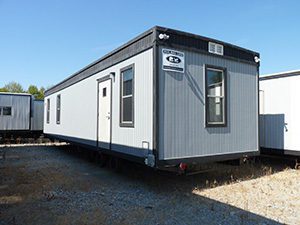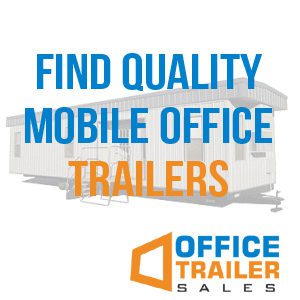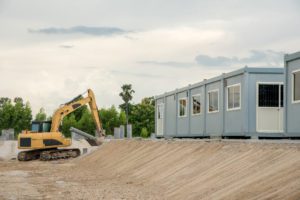
Breaking Down Setup, Delivery, and Removal Fees for Office Trailers
When most people think about the cost of an office trailer, they focus on monthly rental rates or the price to purchase outright. But the real cost equation includes a lot more than just what’s printed on the front of the brochure.
As someone who has worked in modular construction for more than 13 years, I can tell you—setup, delivery, and removal fees are often where the biggest surprises (and budget overages) show up.
If you’re planning to lease or buy an office trailer for your jobsite, school, or healthcare facility, this guide will help you understand every piece of the puzzle, so there are no surprises later on.
Delivery Fees: More Than Just a Drive
You’re not just paying for a trailer to be hauled from point A to point B. Delivery fees include route planning, equipment handling, and in some cases, obtaining permits. If your site is located in a remote area or far from the supplier’s yard, expect costs to rise accordingly.
Local deliveries tend to fall on the lower end of the scale, usually starting around $500. But when the trailer needs to cross state lines, requires an escort vehicle, or must follow restricted commercial routes, it’s not uncommon to see that number reach $2,500 or more.
Ask your provider whether permitting is included, and if your specific location will add any complications to the route. The more complex the journey, the more planning (and cost) involved.

The Real Work Begins During Setup
Delivery might get the trailer to your property, but setup is what makes it usable. This is the phase where the trailer is leveled, blocked, anchored, and stabilized to create a safe and functional workspace.
Setup fees vary significantly based on trailer size, type, and site conditions. For a simple single-wide unit on level ground, costs may stay under $2,000. But trailers that require plumbing, electrical hookups, ADA access, or additional stabilization can push setup costs well past $4,000.
A healthcare provider using a double-wide with multiple rooms and restrooms is going to require a more intricate setup than a construction foreman’s office near a flat jobsite. In either case, coordination with utility providers, inspectors, and sometimes local zoning offices will be required—and not all of that is covered by the setup fee.
Utilities: A Cost That’s Easy to Miss
One of the most frequently overlooked expenses comes from connecting the trailer to existing utilities. If your trailer includes a restroom, break room, or even basic climate control, it will need to be connected to electric and water service—and those connections aren’t free.
Electricians and plumbers may charge anywhere from $500 to $3,000 depending on the distance to hook-up points, local codes, and trenching needs. And if you’re placing a trailer on undeveloped land, you may need to budget even more for temporary power poles or holding tanks.
Always clarify who’s responsible for coordinating these services: your trailer supplier or your own general contractor.

Removal: What Happens When the Job Is Done
Once the trailer has served its purpose, it needs to be taken down and hauled away. This is not just a matter of reversing the delivery process. Removal involves disconnection from utilities, dismantling steps or ramps, removing skirting and anchoring, and hauling the unit safely off the property.
These services usually start around $800 but can exceed $2,000 depending on the complexity of the install and how long the trailer has been on site. If the trailer has been skirted or anchored to concrete pads, expect additional time and labor to be involved in getting it safely detached and prepped for transport.
It’s important to include removal in your upfront budget planning—especially for temporary installations like construction trailers or seasonal office use.
Site Prep Often Falls on You
Don’t forget that before delivery or setup can happen, your site may need some prep. This includes leveling the area, clearing debris, and sometimes installing gravel or concrete pads. These costs usually aren’t included in trailer rental agreements and must be handled by your own crew or a subcontractor.
Depending on the conditions of your property, site prep might cost just a few hundred dollars—or several thousand. If you’re working on uneven terrain or during wet seasons, it’s always better to overestimate the prep time and budget to avoid delays during delivery.
Not All Quotes Are Created Equal
When comparing quotes from office trailer suppliers, don’t just look at the monthly rental or purchase price. Review each quote carefully to identify what’s included and what’s going to be added later.
Some vendors roll delivery and setup into a flat rate. Others separate every service—delivery, blocking, leveling, skirting, electrical hook-up—and quote them individually. That’s not a bad thing, but it does require that you read the fine print and ask the right questions.
Is utility hookup included? Who handles permits? What happens if there’s bad weather during setup? These are the kinds of details that make or break your schedule—and your budget.

The Bottom Line
Office trailers are incredibly flexible and cost-effective—but only when all costs are understood upfront. The biggest budgeting mistake I see clients make is focusing solely on rental rates without factoring in the additional services that get the trailer on-site and operational.
If you’re planning to use a trailer for your next project, take time to map out every phase: delivery, setup, utility connection, and removal. It may add a few line items to your budget, but it will save you from major surprises once the project is in motion.
Written by Daniel Hart, a University of Michigan graduate with a bachelor’s degree in Construction Engineering. I’m the owner of a successful modular construction company in Ohio and a writer and editor for Office Trailer Sales. With over 13 years of experience, I help healthcare organizations expand faster and smarter through innovative modular building strategies.

Leave a Reply